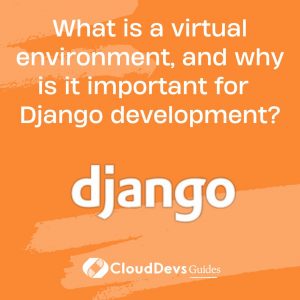What is a virtual environment, and why is it important for Django development?
A virtual environment, often referred to as a “virtualenv” in the Python development world, is a crucial tool for Django development. It’s essentially an isolated Python environment that allows you to manage project-specific dependencies separately from the system-wide Python installation. Here’s why virtual environments are important for Django development:
- Isolation of Dependencies: Virtual environments enable you to create isolated environments for different projects. This means that each Django project you work on can have its own set of libraries and dependencies without interfering with one another. This isolation ensures that changes made in one project, such as upgrading a library, won’t break another project using a different version of the same library.
- Version Compatibility: Django and its related packages evolve over time, and different projects may require different versions of these packages. A virtual environment allows you to specify and manage the exact versions of Django and its dependencies for a particular project. This ensures that your project remains compatible with the versions it was developed with, even if you upgrade Django or other packages for other projects.
- Ease of Deployment: When you’re ready to deploy your Django project to a production server, having a virtual environment simplifies the process. You can create a requirements.txt file that lists all the project’s dependencies along with their versions. This file can then be used to recreate the exact environment on the production server, ensuring consistency and reducing the chances of runtime errors.
- Cleaner Development Workflow: With virtual environments, your development environment remains clean and uncluttered. You won’t accidentally install packages globally, which could lead to conflicts or difficulties in tracking dependencies. Virtual environments keep your system Python installation untouched, reducing the risk of breaking system-level packages.
- Security: Virtual environments can enhance the security of your projects. If a project is compromised, it won’t affect other projects or your system as a whole since it operates within its isolated environment.
Virtual environments are indispensable for Django development because they provide a controlled and isolated environment for managing project-specific dependencies. They ensure version compatibility, ease deployment, promote a clean development workflow, and enhance security, making it easier to develop and maintain Django projects with confidence. To create a virtual environment, you can use Python’s built-in `venv` module or third-party tools like `virtualenv`.






